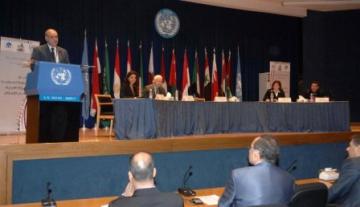
The United Nations Economic and Social Commission for Western Asia (ESCWA) and the UN Information Centre in Beirut (UNIC) today marked the International Women’s Day (IWD), holding two roundtables that recommended emphasizing the needs of rural and poor women and introducing laws to protect women from stereotypical images in the media.
The ceremony and roundtables, held at the UN House in Beirut, were organized in partnership with the Specialized Media and Advertising Research and Training Center (SMART) and Neswa Café website under the slogan “Towards a Positive Image of Arab Women in the Media”. Statements were first delivered by ESCWA Deputy Executive Secretary Nadim Khouri, SMART’s Director Randa Yassir, and head of Neswa Café Ali Atwi. The ceremony was attended by several diplomats and representatives of UN organizations, Non-Governmental Organizations and news media.
Khouri said the UN is celebrating IWD this year under the slogan “Empower Rural Women - End Hunger and Poverty,” as these women play critical roles in both developing and developed countries. He noted that agricultural workers represent 43 percent of labor around the world, of which 70 percent are women. Strenuous efforts made by the UN and by national mechanisms and organizations to integrate women into development processes at all levels need a solid, effective and long-lasting partnership with the media, Khoury underlined. ESCWA is pursuing gender mainstreaming and promoting equality in official institutions, and has started implementing this project in labor ministries of several member countries with the hope of extending it to other governmental organizations and to the media, the ESCWA official added.
Yassir of SMART said her center, in collaboration with Neswa Café and under the auspices of ESCWA’s Centre for Women, embarked on this project in pursuit of a better image of Arab women in the media. It aims at building a partnership between media professionals on the one hand and women’s rights activists and experts in the Arab world on the other. She said they were hoping to take their program to several Lebanese regions and to conclude with an interactive event on IWD next year.
For his part, Atwi said Neswa Café promotes the image of “an educated, knowledgeable and capable woman whose qualifications are what draw attention to her”. It is a news website dedicated to women’s affairs and monitors major, relevant cultural and social events. The mission of Neswa Café, he said, is to motivate Lebanese women into playing a greater role in society, as “it is no longer acceptable to marginalize them under obsolete headings and nomenclatures and at a time when they are reduced to mere physical attraction and good looks”.
Following the opening, participants went into two separate roundtables. The first focused on “Women and Traditional Media” and was moderated by UNIC Beirut Director Bahaa ElKoussy and Yassir. The second examined the issue of “Women and Social Media” and was moderated by the Chief of ESCWA Centre for Women Mehrinaz Al Awadi and Atwi.
The debates concluded with a set of recommendations focusing on the need to train media reporters and editors on covering women’s issues, needs and roles in their community’s development, as well as training women activists on the use of social media programs and interconnecting websites of women organizations. They emphasized the role of the UN and other international organizations and actors in supporting the media and amplifying their interest in women’s affairs and needs.
Participants also called for creating a mechanism to monitor visual media and their role in shaping the image of women. They affirmed the need for traditional media to highlight issues of women overburdened with social challenges and providing these media with sufficient cultural and scientific knowledge about those issues. These media should also present women and their issues through a new perspective based on their social and leadership roles.
In 1975, the UN marked the first IWD on 8 March as part of the UN Decade for Women (1975-1985). In 1977, the UN General Assembly adopted a resolution to celebrate the UN Day for Women's Rights and International Peace in a bid to prove that securing peace and social development, human rights and fundamental freedoms requires women's contribution and development as well as achieving equality for them.





